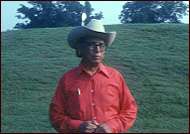Archie Sam
| Archie Sam | |
|---|---|
 Archie Sam in 1983 at the Grand Village of the Natchez in Natchez, Mississippi | |
| Natchez-Cherokee-Muscogee Creek, enrolled United Keetoowah Band[1] leader | |
| Personal details | |
| Born |
June 30, 1914[2][3] Greenleaf Mountain community[3] |
| Died | May 23, 1986 (aged 71)[2] |
| Resting place | Fort Gibson, Oklahoma[2] |
| Spouse(s) | Maudie Louise Quinton Sam[2] |
| Children |
Roy Wayne Sam Adeline Naeher |
| Parents | Creek Sam and Aggie Cumsey |
| Education | Connors State College, Bacone College[3] |
| Known for | Traditionalist and cultural historian |
| Religion | Four Mothers Society[3] |
Archie Sam (30 June 1914 – 23 May 1986) was a Natchez-Cherokee-Muscogee Creek traditionalist, stomp dance leader, scholar, enrolled member of the United Keetoowah Band of Cherokee Indians, and the Sun Chief of the Natchez Nation.
Early life and military service
Archie Sam was born in the Greenleaf Mountain community near Braggs, Oklahoma on 30 June 1914.[2] Archie was the youngest son of White Tobacco Sam,[3] son of Creek Sam, and his mother was Aggie Cumsey, a fullblood Longhair clan Cherokee.[3] Archie Sam was the grandnephew of Watt Sam, the last native speaker of the Natchez language.[4]
Sam married Maudie Louise Quinton Sam (1914–2006), and the couple had two children, Roy Wayne Sam (1945–2011) and Adeline Naeher.[2][3]
Sam attended Bacone College in Muskogee and graduated from Connors State College in Warner. He then enlisted in the 45th Infantry Division and in 1940 he served overseas in World War II, participating in special missions at Thule Air Base in northern Greenland where he met and hunted with the Inughuit.[5] After the war he transferred to the United States Air Force where he remained in the Air Force for 21 years before working for the United States Postal Service.[3][5]
Cultural work
In 1977 Sam worked with professor Charles Van Tuyl to recover sound recordings of Watt Sam that had been archived at the University of Chicago. These are the only known recordings of the Natchez language being spoken.[6]
Upon retiring in 1971, he dedicated himself to the preservation of his indigenous heritage.[4][5] He was a practitioner of native Natchez religion, and in 1969 he revived the Medicine Springs ceremonial ground,[7] located near Gore, Oklahoma.[4]
Death
Archie Sam died on 23 May 1986 and is buried in the Fort Gibson National Cemetery in Fort Gibson, Oklahoma.[2]
Notes
- ↑ Slagle, Allogan. "Burning Phoenix: A Study of the Federal Acknowledgment, Reorganization and Survival of the United Keetoowah Band of Cherokee Indians in Oklahoma, and of the Cherokee Nation of Oklahoma's Efforts to Terminate the Band." Keetoowah Band of Cherokee Indians via The Original Keetoowah Society. 1993. Retrieved 13 Sept 2013.
- 1 2 3 4 5 6 7 "Archie Sam." Find a Grave. 3 Sept 2013.
- 1 2 3 4 5 6 7 8 Mails xv
- 1 2 3 Nabokov 113
- 1 2 3 Interview with Archie Sam August 30th 1976, Mississippi Department of Archives and History Archived March 5, 2016, at the Wayback Machine.
- ↑ Richard L. Fricker (October 9). "Language of extinct tribe haunts scholar". Boca Raton News. Retrieved 3 September 2013. Check date values in:
|date=(help) - ↑ Barnett, James F. Jr. (2007). The Natchez Indians: A History to 1735. Jackson, Mississippi: University Press of Mississippi. p. 134. ISBN 9781578069880. OCLC 86038006.
References
- Mails, Thomas. Cherokee People: The Cherokee People: The Story of the Cherokees from Earliest Origins to Contemporary Times. Council Oak Books, 1996. ISBN 978-0933031456.
- Nabokov, Peter. Native American Architecture. Oxford: Oxford University Press, 1989. ISBN 978-0195037814.